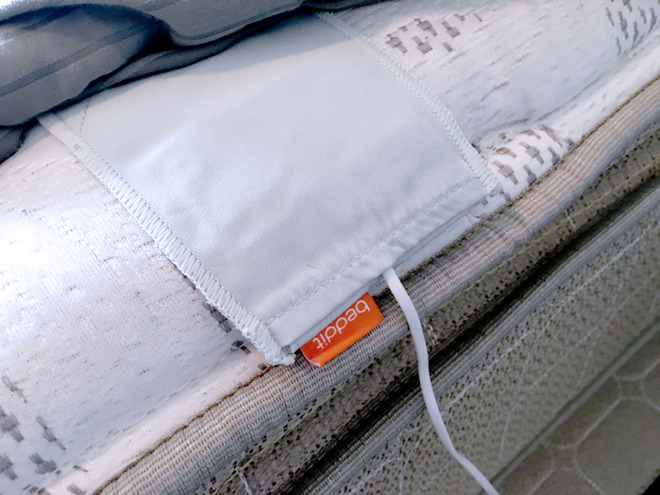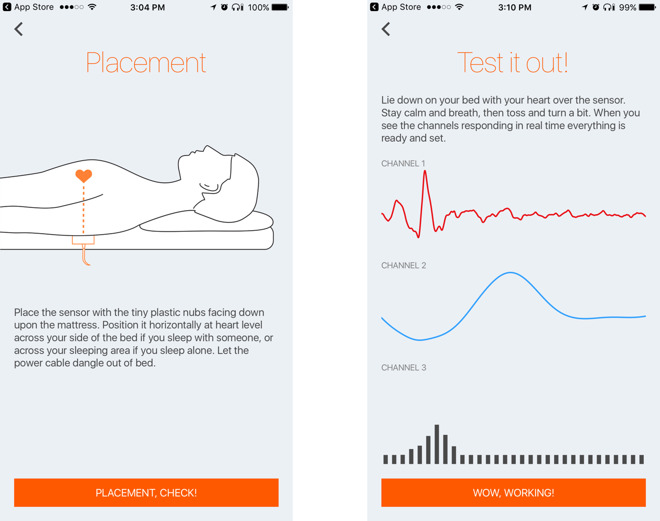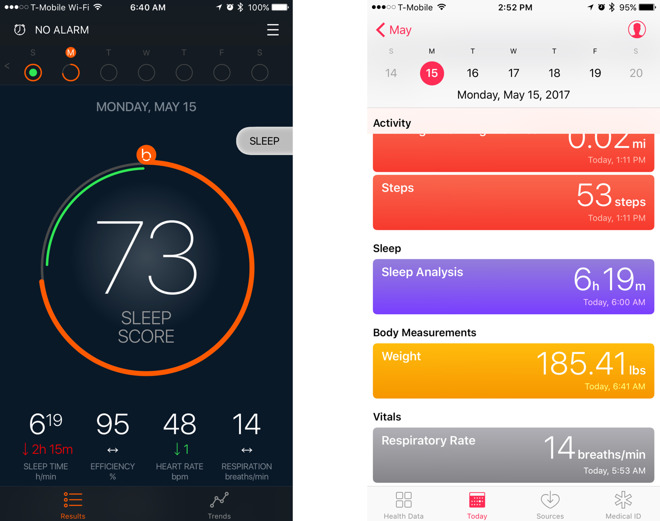Beddit's HealthKit-ready sleep-tracking technology -- recently acquired by Apple -- works well enough and may be useful for problem sleepers, but is probably a luxury for most people, and more a harbinger of what we can expect with the third-generation Apple Watch.

Installing the Beddit 3 is relatively simple. The key component is a thin, fabric-enclosed sensor strip that slides between a bedsheet and a mattress, positioned roughly where a person expects their chest to be resting. Power is supplied through a bundled USB cable and adapter.
The Beddit iPhone app -- which includes an Apple Watch companion with an extra "Nap" feature, by the way -- guides users through the setup process, including pairing and choosing whether a bed holds one person or two, since that can affect readings. Note that an extra phone and tracker are needed to read a second person's data.

Together the device and app monitor several stats, including time, "efficiency," heart rate, respiration, and even a room's temperature and humidity, all with the idea of analyzing trends and offering recommendations. The app can even listen for snoring, assuming a user has their iPhone's microphone close enough.

By default people are expected to manually turn tracking on and off, and in fact Beddit suggests sticking with this for the first few days. After that automatic tracking becomes an option, triggered by laying in bed with an iPhone nearby. That means of course that the mode should be left off by anyone who regularly lays in bed to read a book or watch TV, or has a pet that might set things off.
We'd actually strongly recommend against the automatic mode for other reasons. If you need to get up for any reason, tracking will probably stop and reset. In another instance though the app claimed we were still in bed after we'd already been up for a few minutes, even setting off an alarm. Manual mode is, ironically, a much smoother experience.
We otherwise found the app easy to use and clearly laid out, making it simple to see how one night went versus the one before, as well as longer-term patterns. It's difficult to judge accuracy since we don't have access to medical-grade equipment, but sleep stats were roughly in line with our experience with the Garmin Fenix 5, which likewise identifies light and deep phases of sleep.
The app's summaries and recommendations were a little uncanny. It not only determined that we took a long time to fall asleep, but (correctly) realized that our sleep showed signs of stress, and suggested we reach out to other people to help relax.
We also tested the app's "smart" alarm, which tries to make users feel refreshed by waking them during light sleep no more than 30 minutes before a set time. This seemed to work as advertised -- once however it did wake us 22 minutes early, which might be a bit much, even if we did feel alert during the day.
One minor issue hardware issue we encountered was with the sensor strip. The bottom side uses textured rubber to stay put on a mattress, and for the most part, this did the trick. Violent tossing during sleep can cause the strip to pick up and move however, so restless types may need to improvise -- say, with tape.
Conclusions and the Apple Watch future
The Beddit 3 is a quality product, just one with a hyper-specific purpose: fixing (or at least diagnosing) chronic problems with sleep or waking up. Healthy people who just want to trigger an alarm or see what their sleep patterns are like will probably get more from a sleep-capable wearable, such as recent Garmin and Fitbit devices.
It does, however, offer a glimpse at what Apple probably has planned after its recent takeover of Beddit. The rings in the Beddit app vaguely resemble those in the Apple Watch Activity app, and it's not hard to imagine Activity telling users what their sleep was like, or how to improve it.
What we probably won't see is any respiration, temperature, or humidity data, since that would require sensors away from the wrist. Indeed it's unlikely that we'll see an Apple-branded Beddit follow this one, unless the company plans a major health push beyond the Watch.
The major obstacle to Watch-based sleep tracking, though, is battery life, since the Series 2 barely lasts a day. The "Series 3" coming this fall is rumored to be getting an improved battery, but it would probably have to last two full days to be truly useful.
For now, we'd only consider buying a Beddit 3 if we had immediate sleep issues to deal with and didn't mind tapping "Sleep" in an app every night.
Score: 3.5 out of 5
Where to buy:
People looking to get the Beddit 3 Sleep Monitor can do so at Apple for $149.95 with free 2 business day shipping.